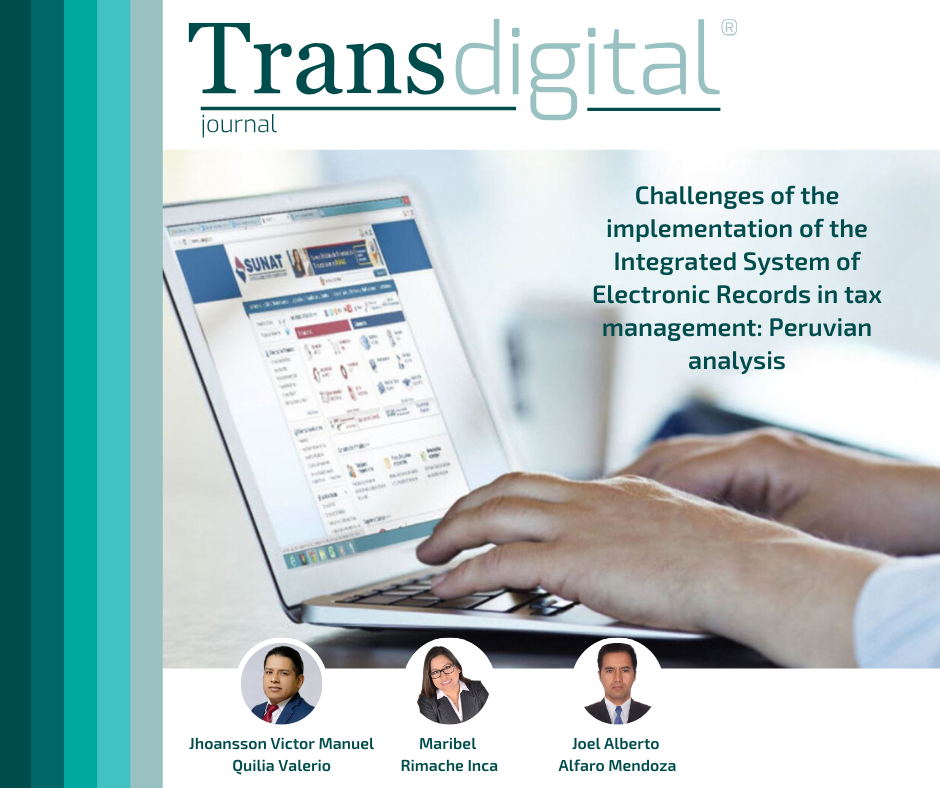Challenges of the implementation of the Integrated System of Electronic Records in tax management: Peruvian analysis
DOI:
https://doi.org/10.56162/transdigital278Keywords:
electronic invoicing, tax digitalization, tax management, taxpayerAbstract
Technological advances have had a profound impact on the efficiency of the processes of tax administrations that have sought fiscal transparency; this, in response to reducing the levels of tax evasion by taxpayers. The study aimed to analyze the challenges of implementing the Integrated Electronic Records System in business tax management in the Peruvian context. The method of research was developed under a qualitative approach, multiple case studies, with a constructivist paradigm, according to the phenomenology of Edmund Husserl. Interview guides were administered to seven specialists in taxation and business informatics and forty taxpayers from medium and small companies in Metropolitan Lima. The information collected was analyzed using the triangulation method. The results reveal that the main challenge lies in achieving a high rate of acceptance and adoption among companies of different sizes and sectors, since many resist change due to lack of familiarity with the system, technological and economic investment in training and updates. It is concluded that the challenges in the adoption of this system in tax management require a multidisciplinary approach that encompasses taxation, fiscal policy, and information technologies.
References
Ajala, O., & Adegbie, F. (2020). Effects of Information Technology on Effective Tax Assessment in Nigeria. Journal of Accounting and Taxation, 12, 126-134. https://doi.org/10.5897/JAT2020.0416
Aladwani, A. (2016) Corruption as a Source of E-Government Projects Failure in Developing Countries: A Theoretical Exposition. International Journal of Information Management, 36, 105-112. https://doi.org/10.1016/j.ijinfomgt.2015.10.005
Arias, M. (2021). Facturación electrónica un mecanismo de control para el cumplimiento tributario, caso sector carrocero. Revista de Investigación Aplicada en Ciencias Empresariales, 10(1). https://doi.org/10.22370/riace.2021.10.1.2987
Bakunzibake, P., Klein, G., & Islam, S. (2019). E-Government Implementation Process inRwanda: Exploring Changes in a Socio-technical Perspective. Business Systems Research, 10(1), 53-73. https://doi.org/10.2478/bsrj-2019-0005
Barja, J. (2023). SIRE: ¿Cuáles son los principales cambios para tener en cuenta? Ernst & Young Global Limited (EYG). https://www.ey.com/es_pe/tax/sistema-integrado-registros-electronicos-principales-cambios
Bassey, E., Mulligan, E., & Ojo, A. (2022). A conceptual framework for digital tax administration - A systematic review. Government Information Quarterly, 39(4), https://doi.org/10.1016/j.giq.2022.101754
Bellon, M., Dabla, E., Khalid, S., & Lima, F. (2022). Digitalization to improve tax compliance: Evidence from VAT e-Invoicing in Peru. Journal of Public Economics, 210. https://doi.org/10.1016/j.jpubeco.2022.104661
Bentley, D. (2019). Timeless principles of taxpayer protection: How they adapt to digital disruption. EJournal of Tax Research, 16(3), 679-713.
Bérgolo, M., Ceni, R., & Sauval, M. (2018). Facturación electrónica y cumplimiento tributario. Banco Interamericano de Desarrollo. https://publications.iadb.org/es/factura-electronica-y-cumplimiento-tributario-evidencia-partir-de-un-enfoque-cuasi-experimental
Cabezas, V., & Andrade, J. (2021). Fortalecimiento en la recaudación tributaria mediante la implementación de facturación electrónica. Polo de Conocimiento, 6(3), 1617-1625. https://polodelconocimiento.com/ojs/index.php/es/article/view/2457
Cevallos, J., Sarango, V., Silva, C., & Cocha, J. (2023). Implementación de sistemas de facturación electrónica en el marco del derecho informático: Desafíos y oportunidades para el desarrollo de sitios web en Ecuador. Revista Científica FIPCAEC, 8(3), 259-281. https://www.fipcaec.com/index.php/fipcaec/article/view/866
Chandra, N., Dharma, M., Masdar, R., Muhammad, T., Mapparessa, N., & Meldawati, L. (2020). The Effect of Tax Payer Awareness, Taxation Knowledge and the Implementation of Modern Tax Administration System on Taxpayer Compliance. Advances in Economics, Business and Management Research, 163, 159-162. 10.2991/aebmr.k.210220.028
Código Tributario (2022). Texto Completo Texto Unico Ordenado del Código Tributario. https://www.sunat.gob.pe/legislacion/codigo/
Duque, A., Martins, W., Seco, A., & Zambrano, R. (2022). Data Governance for Tax Administrations A Practical Guide. Inter-American Center of Tax Administrations. https://www.ciat.org/Biblioteca/DocumentosTecnicos/Ingles/2022-data-governance-AT-CIAT-GIZ.pdf
Eboibi, F., & Richards, N. (2019). Electronic taxation and cybercrimes in Nigeria, Kenya, and South Africa: Lessons from Europe and the United States of America. Commonwealth Law Bulletin, 45(4), 716-741. https://doi.org/10.1080/03050718.2020.1726786
Gunawong, P., & Gao, P. (2017). Understanding e-government failure in the developing country context: A process-oriented study. Information Technology for Development, 23(1), 153-178. https://doi.org/10.1080/02681102.2016.1269713
Hernández-Sampieri, R., & Mendoza, C. (2018). Metodología de la investigación. Las rutas cuantitativa, cualitativa y mixta. Editorial Mc Graw Hill Education.
Junquera, R., Lucas, C., Krsul, I., Calderon, V., & Arce, P. (2022). Digital Transformation of Tax and Customs Administrations. World Bank Group. http://hdl.handle.net/10986/37629
Kamara, A., & Kamara, S. (2023). Exploring the Implementation and Benefit of Digital Reforms in Tax Administration: National Revenue Authority (NRA) Sierra Leone. Open Access Library Journal. https://doi.org/10.4236/oalib.1109767
Lewis, S., Yusuf, B., & Rohini, P. (2016). Can Electronic Procurement Improve Infrastructure Provision? Evidence from Public Works in India and Indonesia. American Economic Journal: Economic Policy, 8(3), 258-83. https://doi.org/10.1257/pol.20140258
Liuhong, C. (2022). Research on Tax Collection and Administration Application and Legal Issues Based on Big Data Analysis. Hindawi Journal of Sensors. https://doi.org/10.1155/2022/6578964
Márquez, R. (2022). Transformación Digital y Tributación: Caso peruano. La Ley. https://laley.pe/art/13282/transformacion-digital-y-tributacion-caso-peruano
Mergel, I. (2016). Agile innovation management in government: A research agenda. Government Information Quarterly, 33(3), 516-523. https://doi.org/10.1016/j.giq.2016.07.004
Milios, L. (2021) Towards a Circular Economy Taxation Framework: Expectations and Challenges of Implementation. Circular Economy and Sustainability, 1, 477-498. https://doi.org/10.1007/s43615-020-00002-z
Posada, E., & Machado, L. (2021). La experiencia de Chile, Ecuador y México como referentes para entender el proceso de implementación de la facturación electrónica en Colombia. Universidad de San Buenaventura. http://hdl.handle.net/10819/8075
Robbins, G., Mulligan, E., & Keenan, F. (2015). e-Government in the Irish revenue: The revenue on-line service (ROS): A success story? Financial Accountability & Management, 31(4), 363-394. https://doi.org/10.1111/faam.12061
Serrano, M. (2023). Facturación electrónica y cumplimiento tributario. Revista de Investigación e Innovación, 8(3), 133-145. https://doi.org/10.33262/rmc.v8i3.2925
Superintendencia Nacional de Aduanas y de Administración Tributaria - SUNAT (2023). Sistema Integrado de Registros Electrónicos – SIRE. https://cdn.www.gob.pe/uploads/document/file/4876170/SIRE.pdf?v=1689870738
Templado, I., & Artana, D. (2018). Análisis del impacto de la factura electrónica en Argentina. Banco Interamericano de Desarrollo. https://publications.iadb.org/es/analisis-del-impacto-de-la-factura-electronica-en-argentina

Downloads
Autor de correspondencia
El autor de correspodencia se identifica con el siguiente símbolo: *Published
How to Cite
License
Copyright (c) 2023 Jhoansson Victor Manuel Quilia Valerio, Maribel Rimache Inca, Joel Alberto Alfaro Mendoza

This work is licensed under a Creative Commons Attribution 4.0 International License.
All articles in Transdigital are licensed under a Creative Commons Attribution 4.0 International License. Authors hold the copyright and retain publishing rights without restrictions.









